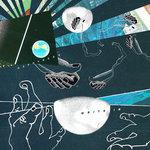
Happyness Write In
(Moshi Moshi / Bar/None)
It’s rare for bands, especially those who come from England, to openly acknowledge that they have a keen interest in emulating their American influences. Happyness do select all the check boxes if they’re asked to about their favorite college rock bands on a questionnaire, but then again, haven’t most post-seventies bands been emulating some past musical trend? So kudos to the South London trio for being so fully transparent about proudly turning that knob “left of the dial.”
So in Write In, the follow-up to their bafflingly masterful debut Weird Little Birthday, Happyness are ready to leave behind their more compliant attitudes on those “what’s your influence questions” influences to readily clarify that they’re, well, just as willing to copy the English, too! But you know, if only they were’t so goddamn good at it. We’ve recently been hit with a superabundance of bands befitting of the "indie rock spectrum" who know how to play their chords and their riffs well from both sides of the Atlantic Ocean, but rarely do many challenge themselves to go outside of their established patterns and motifs.
Happyness mostly separate their de-stressed tunes in two ways: either they wallow in acoustic alienation with steady ballads that are spacious enough for them to let out their sighing quips, or they craft bang-on, straightaway jams that also maintain a steady pace but with sprawling squalls of fuzz guitars. In essence, they’re strict timekeepers who like to let loose once in a while for shits and giggles, with a halfway serious delivery that weaves together new romantic affectations with sly charisma.
If that doesn’t come any closer to describing Happyness, then it’s because they like to constantly switch gears to avoid things from ever getting too boring. Opener Falling Down is undoubtedly the most gorgeous track they’ve written thus far, where both members Jon EE Allan and Benji Compston exchange arpeggioed strums and twinkling crescendoes before it erupts into a makeshift orchestration that provides it with a deserved grand finish. They’ve also got their sights set on early nineties Britpop, but only if it’s done on their own terms: Bigger Glass Less Full is absurdly fully-formed, an ambitious two and a half minutes of Stephen Malkmus-enlightened guitar hijinks and Spanish-tinged guitar work all built inside the body of feathery shoegaze.
Allen tones down some of the goofy, lyrical Jarvis Cocker-isms in exchange of songs that let the trio jerk out delightfully manic rockisms, a clear message need not apply. The driving, spacey groove of Anytime integrates some of early Manic Street Preachers and Painful-era Yo La Tengo with a chipper constitution, while Anna, Lisa Calls has a repurposed oldies feel but with a tougher outer shell. It leads one to discover moments that seem either too busy or in disarray, but with a deeply idiosyncratic flair, sometimes initially serving as a distraction when the casual melodicism they uphold is progressively rewarding.
One very apparent change in Write In, however, is how Allen has molded his more amiable shriek in favor of a more stylized croon, as if trying to achieve nerdy frontman immortality with a curiously nasal rasp that can equally evoke and confound. And his time recording the album in Los Angeles may very well have contributed to this change, as the piano-thumping Through Windows has a distinctly mordant wit behind it that has the feel of sun-baked, Harry Nilsson-encrusted AM pop.
But beyond the deliberate forms of pastiche lies a bracing evolution for Happyness, who now sound like they’re shedding their wildly expressive beginnings in favor of a more cohesive statement that accentuates their songwriting smarts. And besides, it’s not like their lackadaisical charm has been left ignored; if anything, most of Write In upholds a sauntering swing that takes baby steps towards taking a more psychedelic-informed route.
It’s actually the perfect apotheosis of what a band like Happyness pursues: loose, steady-rolling songs speckled with little production and songwriting quirks that add into a meaningful whole. There’s a striking familiarity to it all, as if they’re playing a highlight reel of all your past favorite music moments rolled up into one single memory. They write songs that make you feel good, and sound good, whenever they come on, and they do it in such a way that you truly feel like you’re listening to them for the first time.
10 April, 2017 - 00:26 — Juan Edgardo Rodriguez